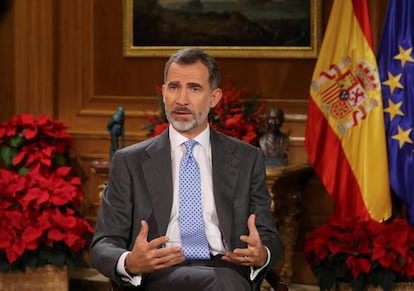Constitutionalist parties back King Felipe’s “reformist” Christmas message
Popular Party, Socialists and Ciudadanos applaud speech while Podemos questions monarch’s words

The three political parties opposed to independence in Catalonia – the so-called constitutionalist bloc – have interpreted the Christmas message of King Felipe VI as an invitation to embark on a much-needed national reform project that is currently stalled in a Spanish Congress handicapped by deep divisions and a minority government.
The Popular Party, the Socialists (PSOE) and Ciudadanos – which together failed to win a majority of seats in the recent Catalan election – highlighted the fact that the monarch had, in his traditional Christmas message, stressed that no one “wants a paralyzed and conformist Spain.”
The Popular Party is concerned about how any eventual changes to the Constitution might look
Against the backdrop of the Catalan crisis, there are a number of reforms on the table of differing degrees of urgency. The most ambitious is the reform of the Constitution being called for by the PSOE – a project the PP wants to downplay over concerns about how any eventual changes might look. The party of Spanish Prime Minister Mariano Rajoy is reluctant to set out on a constitutional reform project without a clear consensus as to what changes are desired.
But there are other reforms, like the financing of Spain’s regions – that regional governments of all stripes are calling for – which are also at an impasse.
The PP vice secretary for communication Pablo Casado said the party backs the king’s Christmas message. “The page has to be turned and a reformist agenda begun,” said the leader of a party that has shown itself unwilling to promote change during periods of uncertainty and which has found it difficult to forge congressional majorities during this legislature. Casado said the Catalan crisis had delayed “for too long” several key reforms.
The secretary for organization of the PSOE, José Luis Ábalos, also gave a “positive evaluation” of King Felipe’s message, interpreting his words as “a commitment to the future.”
“Catalonia deserves a government concerned and occupied with the problems of the Catalans. We want a Catalonia in Spain and a Spain in Europe – a Spain which is also open, modern and inclusive,” said Ábalos, adding the PSOE would push through the reforms necessary to achieve this objective.
The current Spanish Congress handicapped in reform efforts by deep divisions and a minority government
The secretary general of Ciudadanos, José Manuel Villegas , said the king’s Christmas message – which was widely criticized by pro-independence figures in Catalonia – “represented the majority of Spaniards” who feel “proud of the a project that has allowed for “democratic coexistence.”
“We agree with the monarch that this has been a successful project,” said Villegas, referring to King Felipe’s listing of the achievements of Spanish democracy over the last 40 years. “But we also agree that we need to recognize what had been done badly and things which don’t work as well as they should, and for this reason Spain needs, at this time, a new reform and modernization push.”
But not everyone was happy with King Felipe’s message. The leader of the anti-austerity party Podemos, Pablo Iglesias, accused the king of “embracing the argument of the PP” by saying Spain’s economic crisis is over and reforming to corruption in general terms. “Spain doesn’t need kings: it needs high-quality public services, decent work and dialogue,” Iglesias tweeted.
Meanwhile, the PNV spokesperson in Congress, Aitor Esteban, said the king had continued to “ignore the existence of nationalities within the state,” and said the monarch’s Christmas message sounded “more like a warning than dialogue.”
English version by George Mills.
Tu suscripción se está usando en otro dispositivo
¿Quieres añadir otro usuario a tu suscripción?
Si continúas leyendo en este dispositivo, no se podrá leer en el otro.
FlechaTu suscripción se está usando en otro dispositivo y solo puedes acceder a EL PAÍS desde un dispositivo a la vez.
Si quieres compartir tu cuenta, cambia tu suscripción a la modalidad Premium, así podrás añadir otro usuario. Cada uno accederá con su propia cuenta de email, lo que os permitirá personalizar vuestra experiencia en EL PAÍS.
¿Tienes una suscripción de empresa? Accede aquí para contratar más cuentas.
En el caso de no saber quién está usando tu cuenta, te recomendamos cambiar tu contraseña aquí.
Si decides continuar compartiendo tu cuenta, este mensaje se mostrará en tu dispositivo y en el de la otra persona que está usando tu cuenta de forma indefinida, afectando a tu experiencia de lectura. Puedes consultar aquí los términos y condiciones de la suscripción digital.









































